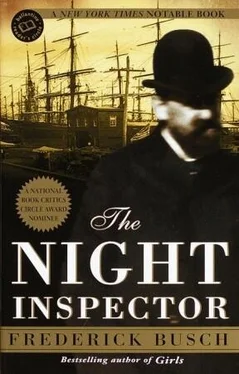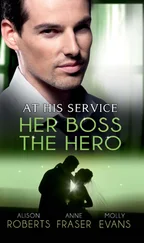A sister of the streets, trawling in desperation before the dawn, opened her thin-lipped mouth as I stalked past. I stopped, for I wondered what she might say.
“Poor fellow,” she whispered. She was scrawny and her naked arms were rough with exposure and not much care. I gave her twenty-five cents.
“For doing what?”
“For not being hungry.”
“Do I look like a charity case?”
“You thought that I did.”
“Then I beg your pardon if I insulted you. You are a veteran?”
She was already staring into the darkness down the street in hope of work. Cool air blew from the north and east, and she clasped her arms across her meager chest. She held my coin in her dark-knuckled hand; her fingernails, I had noticed, were far from clean.
“Sir?” she said. “What is your pleasure, then?”
“It lies, apparently, in assisting a man to give in to his blackest desire, and his greatest danger. I have probably led him to the edge of the world. And all he could think of, sad man, was the river’s edge. Never mind.”
She had stepped backward. “No,” she said, “I never work with a male partner, though I could scare up a girl for the tribade if it suits your fancy. To tell you the truth, though, I would just as soon not, and it would cost you more than you’ve given me.”
“Let’s both not,” I said.
“Then good night?”
“Then keep the two bits and good night.”
“God bless you,” she said.
I still doubted it. I made my way south and west, picking up Orange off Bayard. When I was that young man, in 1867, walking, despite the vapors, with some spring in my step, and with a Colt in my pocket, there were thousands, tens of thousands, of immigrant children, filthy and wild, dangerous as wolves, some of them, who came out with the sun each day in that district; they were there to collect what they could. Someone paid some money for everything. Little more than toddlers, some of them, squired by a brother not too much older, they collected coal that fell from the delivery wagon; there were rag pickers who sold to the Jews; why, there were little fellows who tore their fingers bloody while collecting bits of glass. Often, they were beaten badly by the adults in the trade with whom they competed. The hardiest and often most dangerous were the bone pickers. You found them, too, at dawn, as I found one now, carrying an oily-looking sack and armed with a stick that ended in a metal hook that he used for turning over mounds of ashes or dirt or other filth.
“Leonard,” I said. “Up at the first hint of light, as usual.”
“Morning, Mr. Bartholomew. Have you been to bed yet?”
“I’m on my way, Leonard.”
“You’ve been carousing, I suppose.”
He never looked at me or stopped his restless searching through as foul-smelling a two-foot heap of garbage as I had ever come across. He didn’t seem to mind. He peered and stared and studied, like a myopic man reading a volume of fine print.
“Tonight, Leonard — last night by now — I took a man to his knees, made a new friend, cooperated in the slowing or stoppage of a fat man’s heart, gave charity to a whore, drank dark rum, and ate the freshest bread. Would you call that carousing?”
“I would call this … pewter.” He held the handle of an ale cup in his filthy hand. “Have a look, Mr. Bartholomew.” He brought the stinking fragment toward me and, with it, the smell of his clothing and breath.
“That’s not sweet,” I said, “though no insult’s intended, Leonard.”
“None will be taken,” he said, his dirty face, unshaven and pitted, arched — the brows, the broad mouth — in generosity.
“But it is,” I said, “time to bathe your body and burn your clothes.”
“Ah,” he said, “it is the tendency of a man in my profession that he take on certain characteristics of the materials of his work.”
“You’re too wise for the work.”
“No,” he said, “I’m suited for it. I’m damnably good at it, begging your pardon.”
“I do enjoy the company of happy men,” I said, “and I thank you.” I pressed coins upon his palm, then wiped my fingers on my coat.
“What are you buying, Mr. Bartholomew? Not that I ain’t grateful.”
“Or percipient,” I said, moving on, past a band of feral boys who swaggered, at six or seven, in clothing so foul as to be collectible, by those who wore it, for a transaction at the ragmonger’s. I put my hand upon the butt of my pistol and made certain that they saw me do so. One of them smiled, but it was not much warmer than the artificial mouth on my mask. Sunlight, cool but yellow, lay on the paving stones and on the warehouse walls, and on the horses who patiently stood in their traces while their drivers drank coffee or beer.
In the smell of refuse and ordure and the combined rank exhalations of the poor in their small rooms, I made my way to the Old Brewery. The taverns in the alleys were still noisy, but the sounds were somehow subdued, as if even the air itself that carried the exclamations and music and complaints were exhausted. I passed the door of Chun Ho and could smell the harsh, clean odor of hot water and powerful soap; she would let me bathe in a tin tub for the cost of laundering two shirts, and I thought with pleasure of the steam in which, maskless, I would wallow while she stared at me with her calm, appraising eyes. There was something about her very still face that compelled my attention. On the ground floor, entering the hive, I heard the snoring of Mr. Leone and the sobbing of one of his children. But children, here, were always in tears, and dogs were always howling. It was what gave vent to the general life of the Points — a voice, if you will, for what the populace could never say.
I unlocked my room and, entering, locked the door behind me. I poured a little water into the basin and washed my hands. Removing the mask, I washed the ruins and, gingerly, for I always ached there, dried myself with a towel that smelled of Chun Ho’s brown soap. The bed was a military cot and, removing my clothes, I rolled into it as I had so many times when they’d assembled us at a major encampment. I closed my eyes. I had made promises to Jessie and, in a sense, to Adam as well. He could not be well served by me, I feared, for I had led him across a line — a boundary. I thought of him at the edges of rivers, his red-rimmed, yellowish eyes, his broad, dark nose, his mouth pressed tight with habit over so many years of biting his lip and holding his silence. And I had preached to him of freedom, and had led him to strike a white man down! I owed him some assistance, I thought.
And I was a tradesman, so I also remembered that he felt obliged to me. If owed, I thought, remembering my hand brushing back and forth on the head of the bearskin beside Jessie’s bed, then I must collect. I spent the early morning and the forenoon in falling asleep, then waking myself with wild thoughts — drunken small girls who acted like whores dressed in rouge and furs, a boy with a pistol that he placed inside my mouth most painfully — and with memories: the faces of men I had killed at the instant of killing them. It was, you might say, the customary sleep.
I was invited, and I would go. In truth, I had seen to the invitation because I wished — I now needed — to go to East Twenty-sixth Street, off Madison Square. Business is business and so, of course, might friendship be, and I must confess that I had a bit of what the marksmen used to call buck fever. It had not been an affliction of mine in the War; I had stalked them, and had seen them square; I might have paused before firing, but not very long, and never with the shakes some of them suffered — to the point where their target fell out of their trembling sights. I did, though, sit on my cot, the mask beside my left leg, the Navy revolver beside my right, and wonder — like a raw recruit, like a city man on a bear hunt in the fastnesses of the north country — whether I was adequate to the task. I even considered the rights and the wrongs.
Читать дальше












